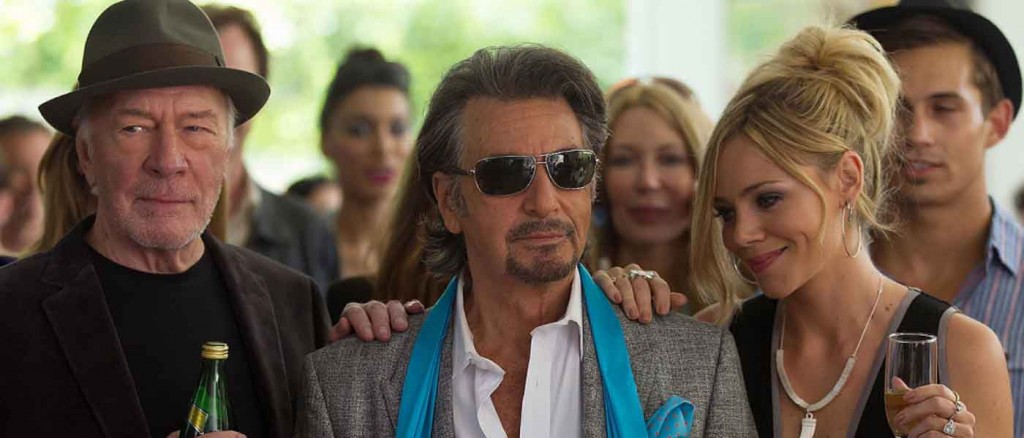Writer and director Dan Fogelman starts Danny Collins off with a flashback to 1971, with the shy young singer-songwriter sitting for an interview with a mouthy magazine writer with his first to-be-a-hit record playing in the background. When the scribe predicts stardom, riches and fame, a face much like a young Al Pacino’s looks thunderstruck with fear.
Fast forward to now, and Pacino’s playing the sunset of Danny Collins’ career as a guy who’s rather enjoyed — no, make that ran roughshod over — all of those perks his young self so feared. We see him performing his big hit song on stage in a mega arena, aging fans mouthing the “Hey, Baby Doll” lyrics along with him as he dances some rather ridiculous looking steps.
Pacino can’t sing a lick, really, far worse than any case of veteran-blowout I’ve ever witnessed in real life. And that song sucks, too, not anything I could ever imagine being a hit at any period during a career that started in 1971, and I was listening to the hits that year and every year since.
Yet Dan Fogelman (goodness, how my mind wanted to turn this music-themed film’s top dog into the name of the late, great Dan Fogelberg at every screen flash) and his well-chosen cast managed to make this my favorite movie of 2015 so far.
The story pulses with heart, but with enough grit, drama and twists to bash through any patent stereotypes and blatant expectations.
It’s got some truth to it, and the opening credits declare that right off with a nebulous nod, saying it was “kind of based on a true story a little bit.”
For his birthday, Danny Collins’ lifelong friend and manager Frank, played with a wry wiseness by Christopher Plummer, gives him a handwritten letter penned to him by John Lennon in 1971. Lennon read that magazine story alluded to at the movie’s start, and wanted to assure the young man that fame did not have to change his art. He sent it to the writer, who rather sinisterly kept it for himself until he died, after which it was sold to a collector. Receipt of this framed gift from Lennon, which included he and Yoko’s phone number and the invitation to call, sends the aging Collins into an introspective road trip to New Jersey.
The closing credits, by the way, include a clip with British singer-songwriter Steve Tilston, who in 2005 received a similar letter written by Lennon after reading a magazine interview when he was 20, saying he did not thus hit the road.
Collins, though, cleans up in a suburban Jersey hotel where he befriends the young help, orders a Steinway sent to his room, develops “patter” with “age appropriate” manager Mary, played reserved and wise to the hilt by Annette Bening, and searches for the son he’s never met.
Fireworks ensue when he heads to his son’s house in hopes of making amends. First he meets too-cute granddaughter Hope, charged up with ADHD, and out-to-there-pregnant daughter-in-law Samantha. Giselle Eisenberg is marvelous as the curious and intelligent youngster, and Jennifer Garner is solid as the sympathetic but loyal wife. They warn Danny that Tom will not be thrilled to see him when he arrives from work. True, that. Bobby Cannavale is perfect as a working-class 40-year-old son who doesn’t want to hear why a rock star father took so long to show up even if it was just a one-night stand with his mother, all angst and pride and FU mixed up with genes and curiosity and human decency.
Pacino makes it work, all of it, a master actor developing a unique chemistry with each and every one of them.
His Danny works hard to remake himself, but he sure isn’t perfect. Danny’s more at ease with himself, though, because for so many years he wasn’t even trying. Lo and behold, this new song that he writes? Pacino’s voice still stinks, but the song itself … not bad.
And the movie doesn’t miss a beat.



